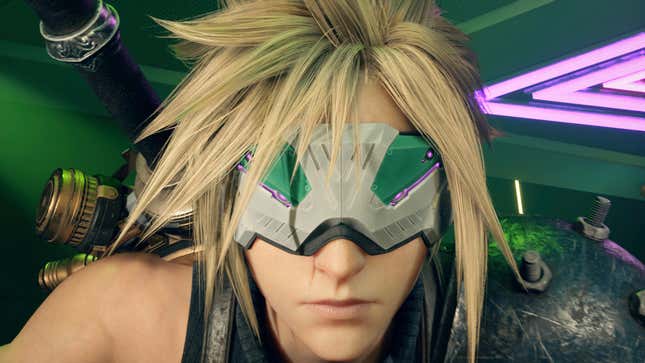
Final Fantasy VII Rebirth has a lot of mini-games. Some might argue it has too many, some also might argue that there are more than we put on this list. The truth is, Rebirth is full of so many diversions from the strategic, action-based combat that you could argue anything that doesn’t have protagonist Cloud Strife swinging his giant sword around is a mini-game. We are trying to not get too in the weeds about what is and isn’t a mini-game, and go with what is most obviously outside of the game’s “common action.” That includes card games, soccer, and even drill team routines. Let’s count down the best and worst Final Fantasy VII Rebirth mini-games.
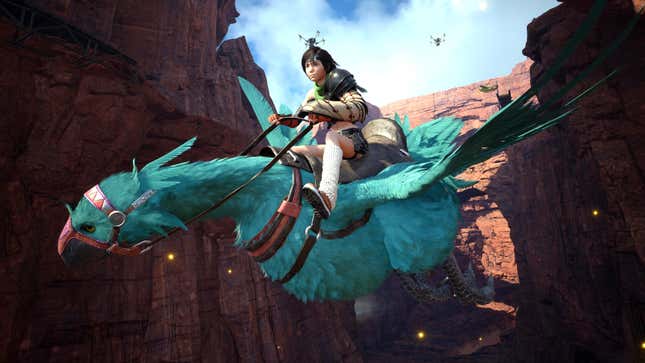
Oh, here we are with an actual loser of a mini-game because we nearly forgot to put this one in here—that’s how memorable it is. (Maybe we also forgot about that shooting thing on the railway in Corel…which, is that a mini-game? I dunno. It was more forgettable than this entry, for sure).
Here’s the thing…as I reviewed screenshots of mini-games, I realized I didn’t hate Glide de Chocobo as much as I thought I did. It did teach me how to traverse Cosmo Canyon’s dizzying heights…but wow, it packs a punishing learning curve. Actually, yeah, it’s a pretty bird and all, but this game just isn’t fun. The chocobo isn’t able to actually power its own flight, so you’re basically falling in style while trying to hit gusts of air from fans to continually move through goals, each of which are numbered and count toward a score at the end.
Read More: How To Make The Most Of New Game Plus In FF7 Rebirth
Glide de Chocobo inspires that very frustrating feeling of constantly falling just shy of a landing in a platformer. In Glide de Chocobo, it’s far too easy to lose altitude and you’ll find yourself grounded way too fast. It sucks all the enthusiasm from your life, making you feel miserable when you inevitably hit the ground.
Yes, it helps you learn how to navigate this region and the sights sure are real pretty up there. But I’d rather not play this game again. — Claire Jackson
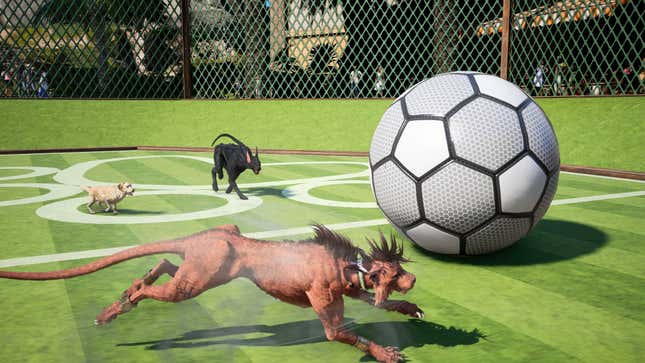
Have you ever wondered: what if Switch Sports soccer was a joyless suck-fest that was also mandatory? Of course you haven’t, because no one could possibly want that. But that’s what you get with Run Wild, Rebirth’s riff on soccer starring everyone’s favorite talking tiger, Red XIII. You’ll be in a square arena with four goals, one on each side. Your job is to kick large, bouncing balls into your opponents’ goals and prevent them from hitting the back of the net on your own. It’s not a terrible premise, but the controls absolutely stink. Red moves slowly and his kicks are infuriatingly inaccurate. Worse still is the alternate version of Run Wild that you’ll encounter on an optional quest for Red, where you have to hit balls into various color-coded goals in numerical order in under five minutes, which is quite literally impossible because the controls are so horrible. I hate this game with the fire of a thousand suns. — Jen Glennon
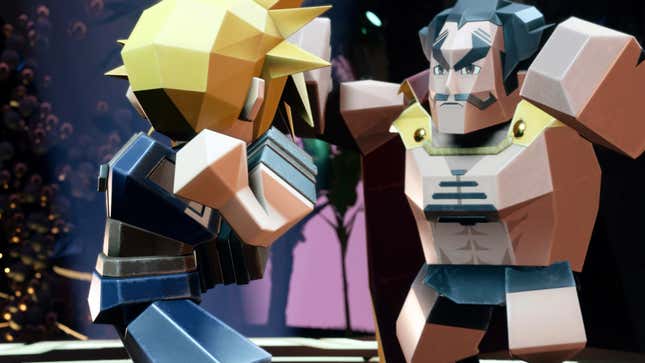
The Kotaku staff largely hates this minigame, but I’ve got a bit of a soft spot for it. Build an arena and I’ll show up I guess, arms swinging and all. Call it my knack for fighters despite my lack of any fighting skills, but I can’t turn down a good bout. It’s especially hard when fighting looks as cool as it does here. with 3D Brawler’s high-definition polygonal fighters. It’s easily where I spent the majority of my time in the Golden Saucer. Fighting games often have a high skill ceiling that I can’t reach, which makes 3D Brawler’s simple Punch-Out-inspired control scheme my ideal level of complexity. On the flip side, the minigame doesn’t evolve much beyond reading simple directional tells, meaning that the only way it meaningfully grows is by speeding things up. Unfortunately, I’m no longer as spry on the sticks as I was in my teenage years, so I face planted more than I succeeded, even if I did have a blast. — Moises Taveras
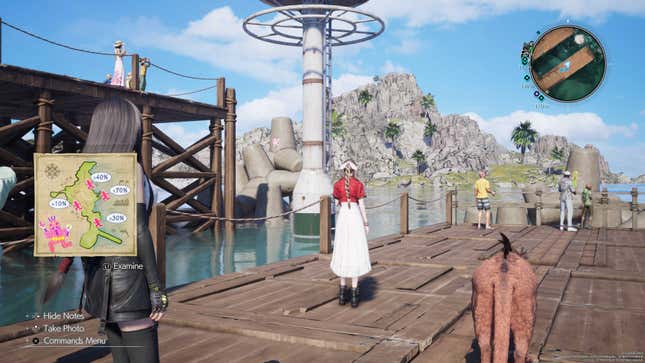
Cactuar Caper is a very simple mini-game, if we can even call it that. You walk around Costa del Sol and snap photos of pink cactuars and then trade them in for some cute beach wear. It’s not a compelling game by any means, and I’d regard it as a missed opportunity because it both shows off how nice it would be if I could swap out the character I explore the world with (during Cactuar Caper, you can swap between Tifa and Aerith with L2) and I wish the camera was more integrated into the game.
It would be nice to have random things throughout the world you could take pictures of instead of Cactuar Caper, one of the game’s best side-quests, and the rather meager “Snaps” open world activity that just has you activate photo mode in random places (you don’t even have to take a picture for this one). So Cactuar Caper ranks quite low on this for its individual activities—and as a clear missed opportunity elsewhere in Rebirth. — Claire Jackson
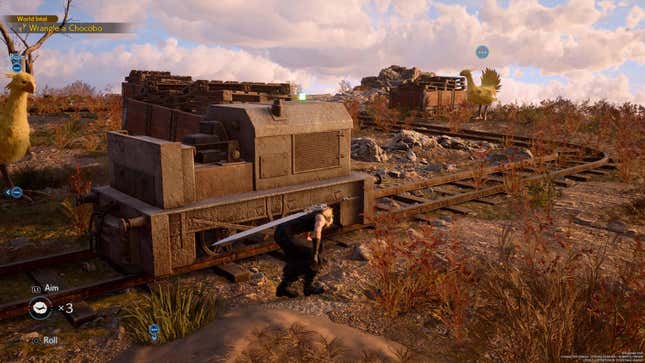
I love stealth games. And I love the chocobos in Rebirth. I don’t mean that in a silly way: I do think Rebirth has the best chocobos in the series. Their animations and sounds areso full of life and happiness that it helps you forget about all the deep trauma that’s in this game otherwise.
Wrangling a chocobo may not have the depth of a Metal Gear Solid or a Splinter Cell, but the stealth isn’t done poorly. It’s simple, to the point, and asks you to hide from chocobos who can spot you.
That said, forced stealth ain’t everyone’s bag. I think Rebirth handles it better than other games have done in the past, but it can be a lot for the unsneaky among us. — Claire Jackson
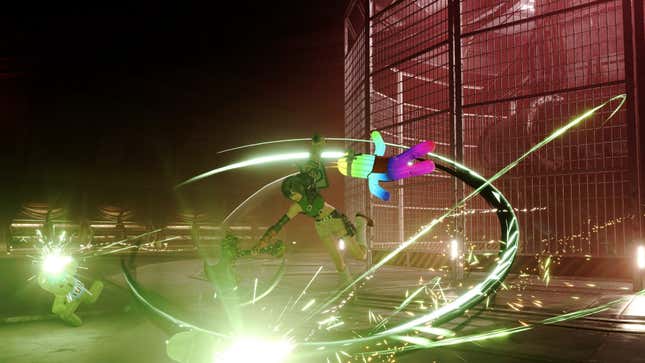
I’ve looked into the face of the devil, and his name is Kid G. Not only is he an absolute freak of nature, but he’s the gamesman behind one of Rebirth’s most annoying distractions, Cactuar Crush. First of all, having to hold up a laser-emitting Cactuar statue, follow said beam to a fight, win that fight, and come back to Kid G before playing the game is a motherfucker of an entrance fee to pay. Then you actually play the minigame, which forces you into the shoes of an arbitrarily picked party member like Aerith, and puts you through combat trials that are, at best, a fine lesson and, at worst, a hell like no other. Suffice to say, every time I was playing Cactuar Crush, I wished I could be doing literally anything else. — Moises Taveras
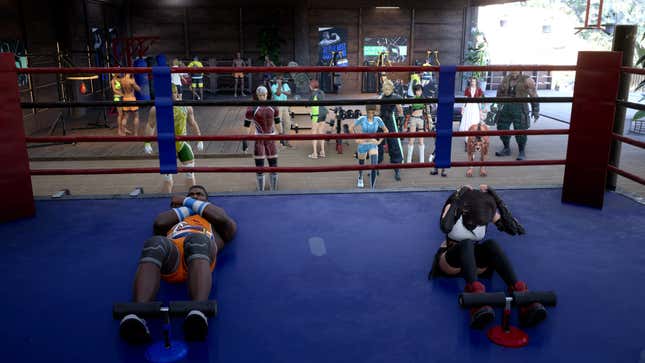
Crunch-off, in which Tifa and some bodybuilders compete to do the most crunches, is a pretty unremarkable but challenging mini-game in Rebirth’s suite of detours. It mostly consists of pressing the shoulder buttons on your DualSense in time with QTEs, with each button press moving Tifa’s rep to the end of its range of motion. The precision and quick onslaught of the prompts are what makes Crunch-off tough, but it is, overall, forgettable in the grand scheme of the game, except for those of us gym sickos who are just there to critique every character’s form. — Kenneth Shepard
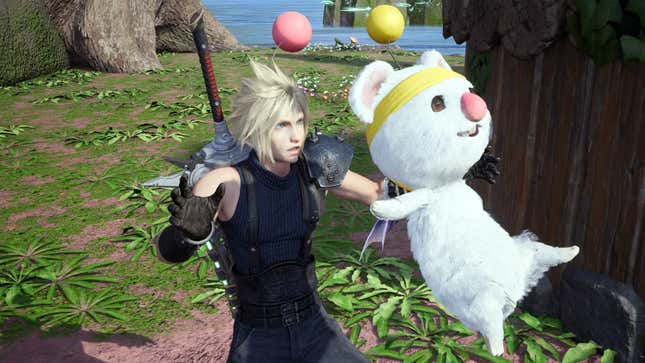
The less time I need to spend with these freaks, the better. If I had my way, Moogle Mischief would be at the bottom of this list…but y’know, democracy.
To be honest, Moogle Mischief can be a little fun at the lower difficulties. How it scales, though, doesn’t help. You gotta wrangle these freaks up like a sheep dog (with all the damn dog jokes, why isn’t this a Red XIII quest?) while dodging their bombs, cyclones, and banana peels at you. Oh, and these weird toothed moogles (which I do pronounce mowgles, thank you very much) taunt you the whole way through.
It’s a strange fever dream that I imagine is quite like all the drugs I won’t touch in real life. — Claire Jackson
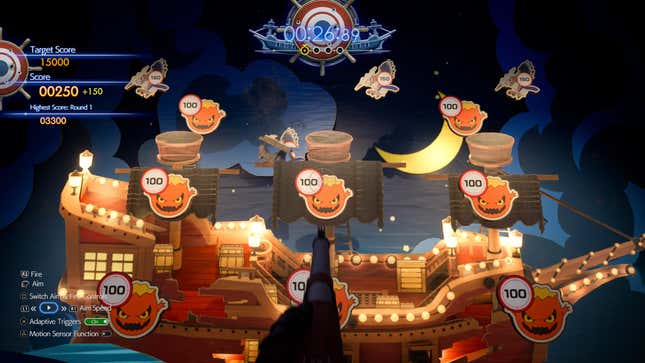
I love a first-person shooter. Give me a thing to aim and a thing to shoot, and I’m happy. While you can’t move around in Pirate’s Rampage like you do in actual FPS games, this one can be a good time—though it certainly is a challenge, especially for me.
I’m a forever Inverted Y-Axis (not X-Axis though, that’s just crazy talk) gamer and Rebirth’s resistance to providing me an option to invert the controls for these mini-games makes the difficulty that much harder for me. But damn, if I didn’t get sucked into it anyway. — Claire Jackson
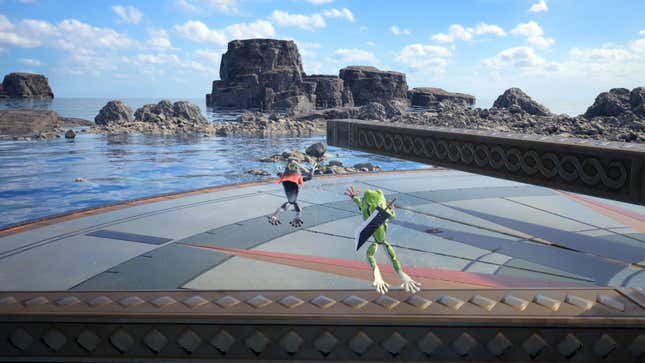
In Jumpfrog, which you encounter as part of a side-quest in Junon, you get turned into a frog and have to remain on a platform as long as possible. This means leaping to avoid spinning beams and, eventually, dashing to stay on solid ground as panels begin to fall out from under you. This feels like a fun little multiplayer minigame you might find in a Mario Party-style collection, but without the vital multiplayer aspect. Back in the day, my friends and I had so much fun playing the Twisted System minigame in Fuzion Frenzy, which has you competing to see who can remain the longest on a spinning platform with obstacles you have to leap over and duck under. You also see stuff like this in Fall Guys’ assortment of challenges, and it’s great fun. But it’s the presence of other players that makes these games so hilarious and exciting. Without them, Jumpfrog is just a fleeting distraction, a bit of a reflex test that offers a pleasant little reprieve from the game’s journeys and battles, but won’t have you leaping back for more. — Carolyn Petit
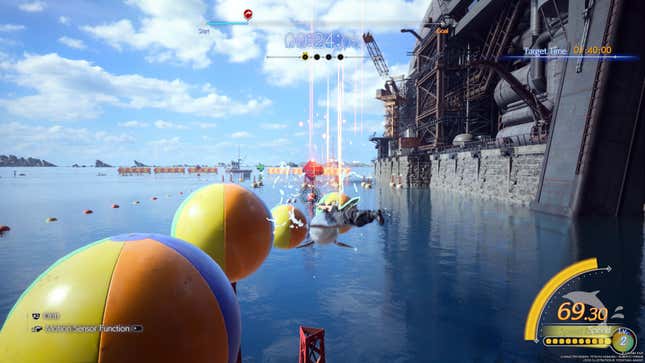
FF7 is a game I’ve loved in the back of my head since I was a child and that feeling only solidified when I finally beat it as an adult. I never got farther than Midgar as a kid, meaning that I never got to FF7’s deeply weird middle section, which Rebirth spins into a whole game. That means I never made it beneath Junon and met the world’s best dolphin, who was relegated to one of the most infuriatingly vague minigames I’ve ever had to do, until much later in life. Rebirth does away with that traumatizing tribulation though and reimagines it as a joyful and straightforward time trial in which Cloud rides a dolphin through a course and rams through beach balls. What isn’t there to love about that sentence? I’m also a sucker for a good drift in racing games, and the ability to do so on a dolphin simply means everything to me. It is exactly in line with FF7’s weirdo spirit without being a chore, and reinterpreting the dolphin’s appearance and this minigame as a way to cheer up the children of the war-torn town is the cherry on top of this bizarrely shaped sundae. — Moises Taveras
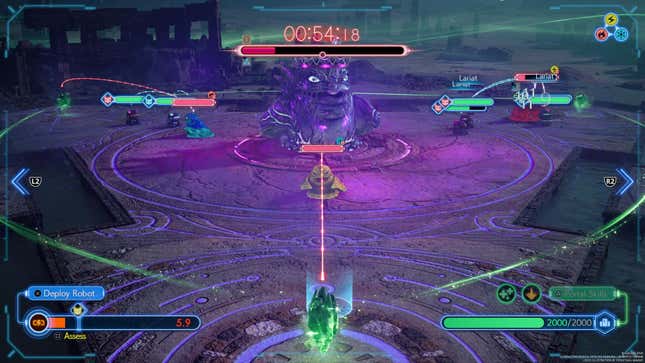
Gears and Gambits is a tough game, if I’m being honest. But by the third or fourth round, the strategy began to really sink in and I started having fun speccing out the robots and sending them to their dea—victories!
Read More: FF7 Rebirth: How To Not Suck At Gears And Gambits
Plus, Gears and Gambits is a part of what I found to be one of the sweetest and most emotional highlights of Rebirth, so its proximity to that easily makes it one of the top 10 for me. — Claire Jackson
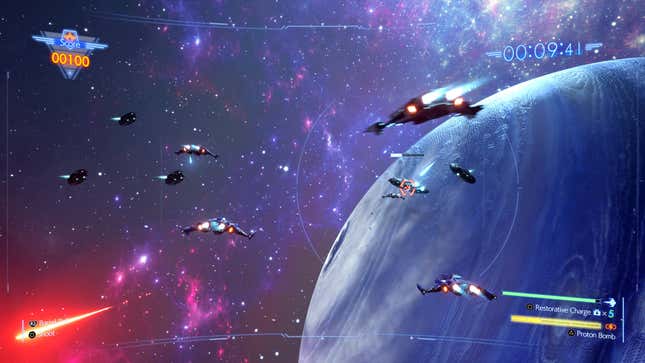
Throughout Rebirth, I was constantly surprised at how often the RPG’s mini-games would commit to just changing genres. I certainly wasn’t expecting to play a full blown Star Fox-esque space combat sim when I started the next step in Cloud’s journey, but as far as those go, Galactic Saviors is a decent enough One of Those. It’s fun, it’s flashy, and it’s got a banging soundtrack. — Kenneth Shepard
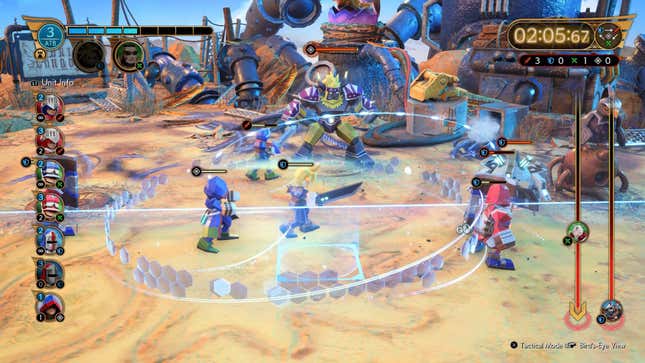
Fort Condor was fun back when it was “Condor War” in the original FF7, and again when it cropped up again as part of Remake’s Intergrade expansion. And it’s still an endearing diversion in Rebirth. It’s a simple tower defense game that Cloud, Barret, and Tifa will repeatedly get sucked into as part of the Junon Protorelic sidequest. You’ll control three types of troops—defense, ranged, and vanguard—and will need to take out all the enemy units within a set period of time. You’ll also have healers, ballistas, and trebuchets at your disposal to turn the tide of battle. The core premise here is the rock-paper-scissors weapons triangle, which is easy to grasp quickly, even though each battle feels unique. Better still, its an excuse to see our heroes in spiffy versions of their low-poly character models from the 1997 game.—Jen Glennon
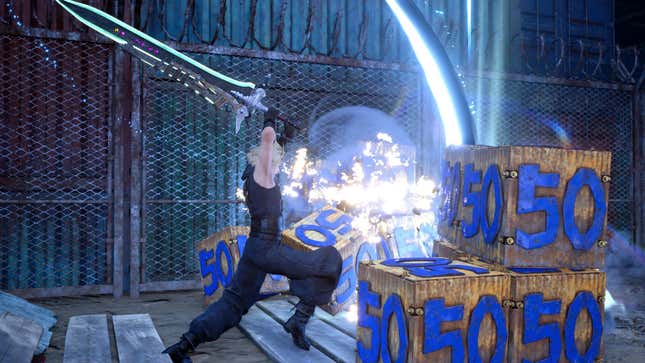
Desert Rush is an evolution of Whack-a-Box, a mini-game that existed in 2020’s Remake. It’s straightforward: Destroy as much shit as you can. And with Rebirth’s combat mechanics as Cloud. How can you not have fun with this?
I’m a very aggressive player in Rebirth (which, yes, has gotten me into trouble). Desert Rush lets me unleash that (with some decent metal backing tracks, if I might add) to the fullest: Go all out, minimize all time wasted and get to slashing. It’s a lovely adrenaline rush that pairs well with a Monster. — Claire Jackson
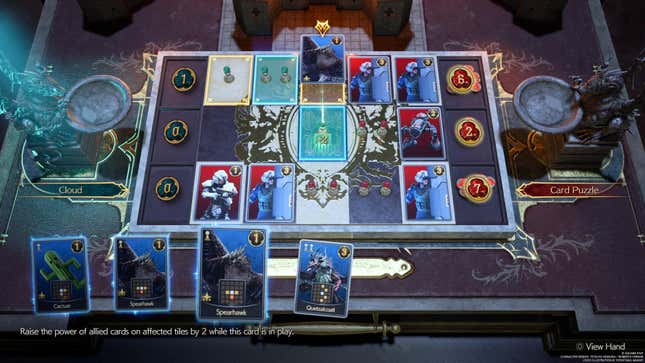
When I first played Card Carnival, I couldn’t quit it fast enough. See, I really struggled to learn Queen’s Blood at first (as you’ll note, I did not write our Queen’s Blood guide as I just took a brute force method to that whole thing), so when Rebirth asked me to play an augmented version of Queen’s Blood…nope, I’m not doing that.
As I find myself now scraping the barrel of doables in Rebirth, I figured it was time to change that and, huh, it actually teaches you how to play Queen’s Blood more effectively. Who’d’ve thought? It sets up what are essentially Queen’s Blood games that have been paused. Some cards are on the board, with pawns available to lay down a preselected hand of cards. There’s a specific way to win each one, which are all great strategies for the actual game itself.
In fact, Card Carnival is particularly great at teaching Queen’s Blood because while you can get through it via brute force (which I am very prone to doing), you’ll get through it way, way faster if you think a few steps ahead of where you are….you know, which is probably how normal people play games like this. — Claire Jackson
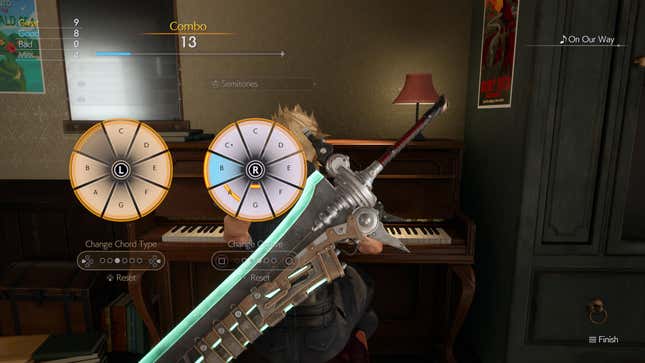
Here’s the very simple thing: if you give millennials a piano, they will play the opening of My Chemical Romance’s “Welcome To The Black Parade.” It’s a fact of modern life that I will never get over. So when FF7 Rebirth’s demo went live and I saw a video of Cloud Strife banging out that iconic opening G chord, I grinned like a dumbass. That feeling extended to much of my time with Rebirth’s in-game piano, where the game asks you to play many legendary tracks from Nobuo Uematsu’s timeless score. One of my favorite moments in Rebirth is the culmination of a side quest where Cloud’s eventually asked to play Tifa’s Theme—one of the most moving compositions I’ve ever heard—as he’s accompanied by a couple of violinists. Reader, I wept like a baby. And though the rhythm game becomes a bit unwieldy (asking players to keep track of two radial tracks fixed to the thumbsticks) on higher difficulties, getting to become a part of these songs was more than worth the frustration. — Moises Taveras
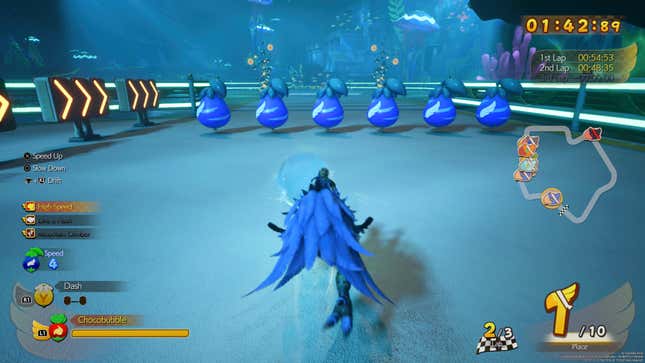
Chocobo Racing really sucked me in. I initially did it to complete a sidequest in the Gold Saucer and then found myself tackling all of the races.
Racing chocobos in Rebirth is a very drift-centric racing game, but it has that ridiculous silliness that Final Fantasy (and especially FF7) had in spades. Cloud makes this random gesture that almost looks like he’s flipping off other jockeys, the chocobo I stuck with for all the races was able to hurl a giant snot bubble at other chocobos and there’s a pretty nice modern rendition of “Electric de Chocobo” in the game’s playlist.
You can spec out your chocobo with hats, chest pieces, and leg wraps. I didn’t put too much thought into what I chose and with the exception of the last two or three races, I rarely struggled. Would’ve been neat to see that more fleshed out, but it’s good fun regardless. — Claire Jackson
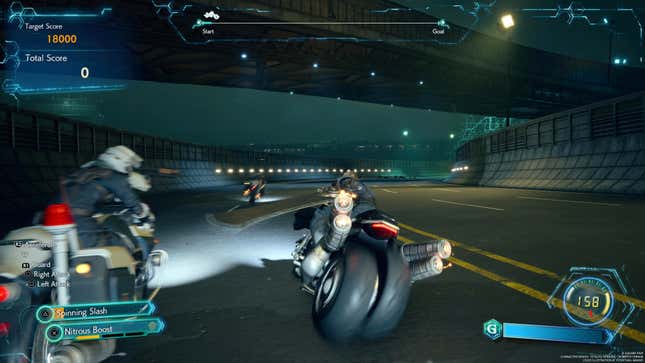
G-Bike is a second spin on one of Remake’s coolest set pieces. Getting to do sick motorcycle battles, even if it’s in a VR simulation, is still an absolute blast. It’s one of the smoothest controlling mini-games in Rebirth’s repertoire, and knocking some asshole off their motorcycle is always, always satisfying. Sure, there are high scores to chase and personal best times to try and shave, but nothing matches the thrill of swinging your giant sword at some prick while you’re on a motorcycle speeding through the streets. That shit’s peak. — Kenneth Shepard
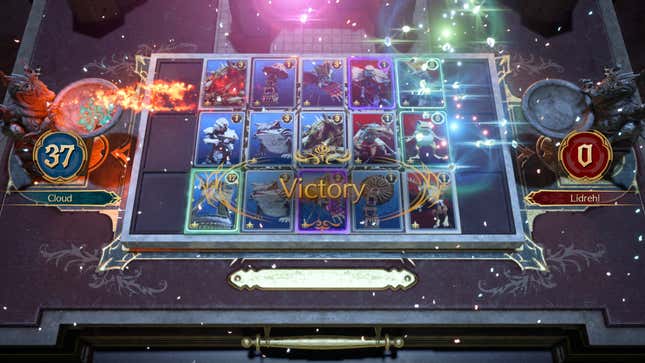
Queen’s Blood, Final Fantasy VII Rebirth’s territory-claiming card game, has gotten a lot of praise for its intuitive take on the genre, but it’s also one of the most interesting mini-games in the RPG because of its place in the world. As director Naoki Hamaguchi told Kotaku, the team at Square Enix wanted Queen’s Blood to feel like a cultural phenomenon, and that’s why everywhere you go, there’s are people ready and willing to throw cards on a table. In a game full of mini-games that exist to fill time, Queen’s Blood makes the most of the space it inhabits with a purpose. Its underlying story is one of Rebirth’s most compelling diversions, and it helps that the base mechanics and deck building are rock solid. Now Square just needs to release a physical version or a standalone game that you can play against friends. It would be a hit at game nights. — Kenneth Shepard
Easily one of the standout moments in Final Fantasy VII Rebirth is when Cloud, Aerith, and Tifa get practically sitcom’d into leading a drill team in Junon to perform in a parade. Cloud’s an ex-SOLDIER, so he knows his way around a rifle, but can he also lead a handpicked group of recruits in a choreographed routine while the world is watching? Turns out, yes he can, and pretty accurately to real drill teams, too.
Mechanically, the Junon Parade pulls from Remake’s Honey Bee Inn dance sequence. Cloud and company perform elaborate, synchronized routines while you rhythmically press buttons as a cursor passes through on-screen prompts. It’s not the most complex rhythm game, and it doesn’t need to be. But it is entertaining enough to bolster a sequence that is still one of Rebirth’s standouts by the time the game reaches its conclusion. It tells you a lot about Cloud and his capabilities, while also making one of Rebirth’s mechanical diversions feel like more than just a distraction. It perfectly marries all the best parts of Final Fantasy VII Rebirth. It can be self-serious while still being goofy, it can take you away from the dire stakes of fighting Sephiroth without losing the character-driven writing that makes the game’s too-long run time endearing, and when it commits to an idea, it executes it in style. — Kenneth Shepard
